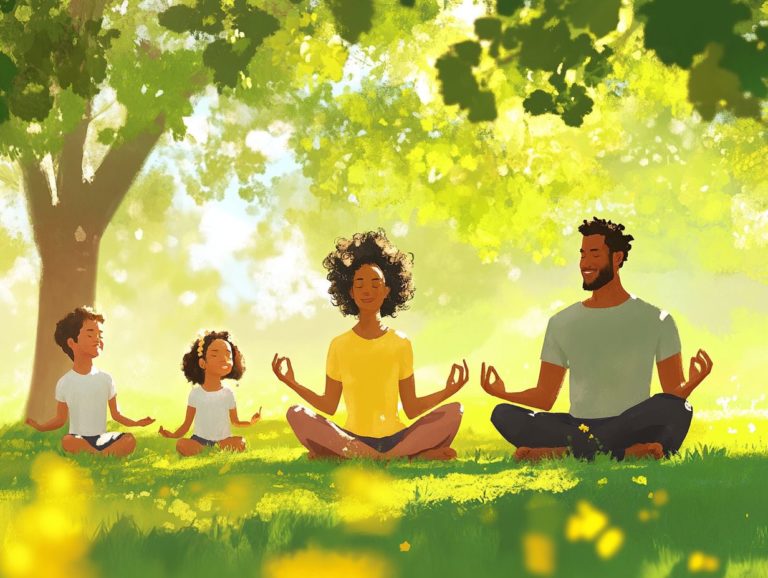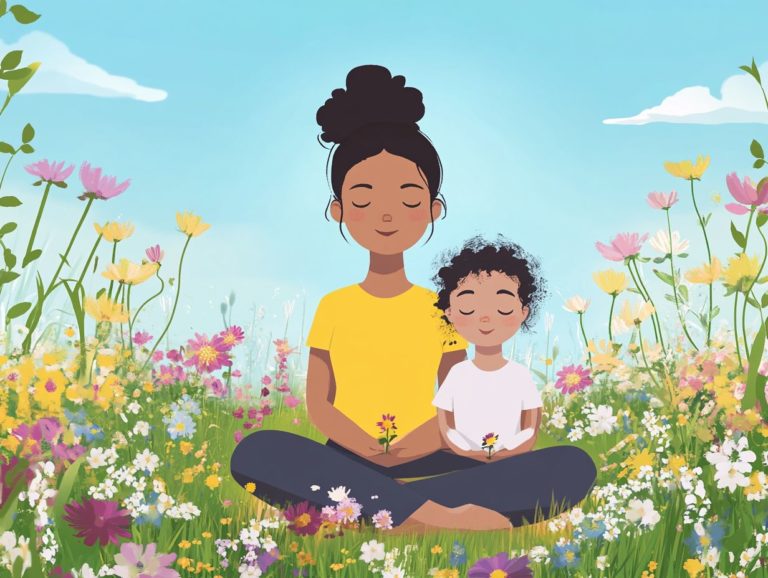Cultivating Gratitude Through Mindfulness
Contents
- Harnessing the Power of Gratitude
- Cultivating Gratitude through Mindfulness
Harnessing the Power of Gratitude
Gratitude transcends the simple act of saying “thank you”; it is a profound practice that can greatly transform your mental and physical well-being through daily gratitude exercises.
As you delve into the essence of gratitude, you’ll uncover its vital role in your life. Explore how embracing gratitude can elevate your mental health and bolster your physical wellness by acknowledging little moments of joy.
Mindfulness serves as an invaluable tool for cultivating this sense of gratitude, providing you with practical techniques like gratitude journaling, meditation, and mindful walks. By adopting a grateful mindset, you may experience a wealth of benefits, including enriched relationships and heightened self-awareness.
Embrace the opportunity to harness the transformative power of gratitude through mindfulness and gratitude meditation, and witness the positive shifts it can bring to your life.
Key Takeaways:

- Gratitude is a positive emotion that involves acknowledging and appreciating the good things in life, even the small and ordinary moments.
- Cultivating gratitude through mindfulness can have significant impacts on our mental and physical health.
- Mindfulness practices like gratitude journaling, meditation, mindful walks, and gratitude letter writing can help us cultivate gratitude and experience benefits such as improved mental health, resilience, relationships, and self-awareness.
What is Gratitude?
Gratitude is a rich and complex emotion that invites you to appreciate the small moments in life while embracing the positive feelings that come from recognizing them. Renowned expert Robert Emmons highlights that gratitude is a cornerstone of feeling good mentally and emotionally, nurturing a mindset that promotes kindness and resilience when faced with life s challenges.
By intentionally cultivating gratitude through daily practices, such as maintaining a gratitude journal or engaging in gratitude reflection, you can deepen your awareness of life s blessings and enhance the strength of your relationships.
Why is Gratitude Important?
Recognizing the importance of gratitude is crucial, as it profoundly influences your mental health, relationships, and overall emotional well-being.
The science behind gratitude unveils a wealth of benefits, such as increased resilience, diminished stress levels, and a heightened capacity for positive thinking. By nurturing a mindset of gratitude, you can cultivate a supportive atmosphere that not only strengthens your relationships but also fosters a healthier perspective on life. According to the Greater Good Science Center, these benefits are backed by extensive social science research.
How Does Gratitude Affect Our Mental Health?
Gratitude enhances mental health by promoting positive emotions and resilience, ultimately leading to improved emotional wellness. Studies indicate that individuals who regularly practice gratitude often report lower levels of anxiety and depression, underscoring the profound impact it has on psychological well-being.
Engaging in gratitude practices like maintaining a gratitude journal or expressing appreciation to others can create a constructive shift in perspective. These techniques not only help you focus on the positive aspects of your life but also foster a deeper connection with yourself and those around you.
As research continues to unveil the links between gratitude and mood regulation, it becomes increasingly clear that adopting an attitude of thankfulness is more than just a fleeting emotion; it is a transformative approach to nurturing your mental health and enhancing overall emotional stability.
The Impact of Gratitude on Physical Health
Research indicates that embracing gratitude not only enhances your mental health but also has a remarkable impact on your physical well-being. This contributes significantly to your overall emotional wellness.
When you practice gratitude, you are likely to experience reduced stress levels, improved sleep quality, and a stronger immune system, showcasing the profound connection between appreciation and physical health. This practice can also lead to increased resilience, as noted by experts like Robert Emmons.
Fostering gratitude can noticeably decrease anxiety and depressive symptoms, creating a positive ripple effect that touches various aspects of your physical wellness.
Expressing gratitude regularly boosts your optimism and encourages a healthier lifestyle, like exercising regularly and maintaining a balanced diet. For instance, gratitude sensory practice, which involves focusing on sensory experiences to enhance appreciation, can make everyday activities more fulfilling and health-promoting.
As you weave gratitude into your daily routine whether through journaling, meditation, or simply acknowledging the positive elements in your life you not only elevate your emotional state but also strengthen your body s resilience.
Practicing gratitude promotes longevity and vitality, enriching both your life and your health.
How Can Mindfulness Help Cultivate Gratitude?
Mindfulness acts as a powerful instrument for nurturing gratitude, enabling you to cultivate a deeper awareness of your thoughts, feelings, and the world around you.
As you engage in mindfulness practices, you ll find your appreciation for life’s subtle moments intensifying, ultimately enhancing your emotional well-being.
By weaving mindfulness into your gratitude routines, such as gratitude meditation and gratitude reflection, you can forge a more profound connection to the present moment and develop a resilient mindset that thrives amidst life s challenges.
What is Mindfulness?

Mindfulness, as Jon Kabat-Zinn defines it, is all about paying attention to the present moment without judgment. This practice cultivates awareness and enhances your emotional wellness. It encourages you to observe your thoughts and feelings while fully embracing the now, making it an incredibly effective tool for nurturing gratitude in your daily life. Studies from the University of California have shown that mindfulness practices can significantly enhance gratitude and emotional stability.
By incorporating techniques like focused breathing, body scans, and mindful meditation, you can forge a deeper connection with your own experiences. This heightened awareness not only helps you recognize and savor the small joys in life but also significantly reduces anxiety and stress.
Through the practice of mindfulness, you learn to acknowledge your thoughts and emotions without letting them overwhelm you. This fosters a sense of acceptance and compassion, both for yourself and for others.
As a bridge to gratitude, mindfulness underscores the importance of living in the moment, ultimately deepening your emotional resilience and enhancing your overall well-being.
Renowned author Ana s Nin emphasizes that we see the world not as it is, but as we are, highlighting the transformative power of gratitude when combined with mindfulness.
Start your gratitude journey today and transform your life!
How Does Mindfulness Help with Gratitude?
Mindfulness enhances your sense of gratitude by promoting a heightened awareness of the present moment. This allows you to truly recognize and appreciate the positive aspects of your life. This practice creates an environment where gratitude can thrive, leading to improved emotional wellness and deeper connections with yourself and those around you.
When you immerse yourself in the here and now, you become attuned to the subtle joys that often slip by unnoticed. These could be the warmth of sunlight on your skin or the sound of laughter shared with loved ones. This present-centered focus encourages a shift in perspective and nurtures a deep appreciation for everyday experiences and interactions. Practicing gratitude mindfulness can heighten your awareness of these moments.
By cultivating mindfulness, you not only enhance your capacity for gratitude but also reinforce your emotional resilience and overall well-being. This establishes a positive feedback loop that strengthens both practices. The relationship between mindfulness and gratitude paves the way for a more fulfilling and enriched life with lasting happiness and appreciation for little things.
Practicing Gratitude Through Mindfulness
Practicing gratitude through mindfulness is accessible through a variety of techniques designed to elevate your awareness and appreciation of life’s many blessings. Engaging in methods like gratitude journaling, meditation, mindful walks, and written gratitude letters enables you to actively immerse yourself in practices that enhance your emotional wellness and build a strong support network. These techniques can also include gratitude sensory techniques, gratitude acknowledgment, and expressing gratitude to create a gratitude community.
Embracing these techniques can transform your perspective and enrich your daily experiences. Start these practices today to transform your life!
1. Gratitude Journaling
Gratitude journaling encourages you to capture the things you re thankful for. This reflective practice elevates your emotional wellness and fosters a resilient mindset. This daily exercise nudges you to pause and acknowledge your blessings, contributing to a more positive outlook on life.
This practice can involve gratitude counting, where you list things you are grateful for, along with gratitude sharing, where you express your gratitude to others. By weaving this practice into your daily routine perhaps before bedtime or while sipping your morning coffee you can cultivate a sacred space for reflection that nurtures contentment.
Whether you choose to list three simple things or engage in more elaborate reflections on your experiences, you ll find that even the most ordinary moments can transform into sources of joy. This daily gratitude practice helps reinforce a gratitude mindset.
Studies show that gratitude journaling not only enhances your mood but also strengthens relationships by fostering empathy and appreciation for others. As you embrace this simple yet profound habit, you may discover that even in the face of challenges, a sense of gratitude serves as a powerful anchor. This promotes a healthier emotional state and bolsters your resilience. This practice, supported by social science research, emphasizes the importance of gratitude exercises in daily life.
2. Gratitude Meditation
Gratitude meditation is a powerful mindfulness practice that allows you to cultivate feelings of thankfulness and appreciation, leading to stress relief and improved emotional wellness. By dedicating time to reflect on what you are grateful for, you can seamlessly integrate gratitude into your daily mindfulness routine.
This intentional focus not only lifts your mood but also helps you recognize and appreciate the positive aspects of your life, even when faced with challenges. Techniques for engaging in gratitude meditation often include visualization, where you imagine specific moments or people you are thankful for, and journaling, which encourages you to express your gratitude in writing.
As you develop a consistent routine, you’ll likely find yourself noticing blessings in your everyday encounters. This fosters a deeper connection to the present moment. Ultimately, by embracing these practices, you can experience a transformative shift, allowing gratitude to become a guiding principle that enhances your overall quality of life.
3. Gratitude Walks
Gratitude walks invite you to take time during your strolls to consciously reflect on the things you appreciate in your life, beautifully merging physical activity with mindfulness to elevate your emotional wellness. This practice deepens your connection to the environment, encouraging you to recognize the beauty and positivity all around you.
As you embark on these walks, you intentionally focus on your breathing and your surroundings, allowing each step to anchor you in the present moment. With every stride, you might find yourself mentally listing the aspects of your life for which you are grateful whether it s the warmth of supportive friendships, the splendor of nature, or your personal achievements.
The combination of walking and mindfulness not only boosts your physical health through exercise but also cultivates a profound sense of joy and fulfillment. Gratitude walks remind you of life’s abundance, nurturing a positive mindset that can help you navigate everyday challenges while enhancing your overall emotional resilience.
4. Gratitude Letter Writing

Writing gratitude letters involves crafting heartfelt notes to individuals who have made a difference in your life, turning it into a powerful way to improve your emotional well-being and fortifying your support network. This practice not only cultivates a sense of appreciation but also enriches relationships through meaningful communication.
By expressing your feelings of gratitude, you reinforce the connections with your loved ones, fostering a sense of belonging and community. Articulating gratitude can lift your mood, alleviate anxiety, and even promote better physical health.
As you take the time to pen these letters, you not only reflect on the positive influences in your life but also pave the way for deeper connections. This exchange of mutual appreciation can elevate both you and the recipient. Writing gratitude letters is a joyful reminder of all the goodness in your life! This simple yet profound act encourages a more optimistic perspective and expands your emotional network.
Benefits of Cultivating Gratitude Through Mindfulness
Let s explore the benefits of incorporating gratitude into your mindfulness practices. Cultivating gratitude through mindfulness presents a wealth of benefits that enrich your emotional wellness, bolster your resilience, and strengthen your interpersonal relationships.
Engaging in mindfulness practices that embrace gratitude not only elevates your mood but also fosters a deep sense of appreciation and connection. This, in turn, enhances your relationships and cultivates a more positive outlook on life overall.
1. Improved Mental Health
One of the most remarkable advantages of cultivating gratitude through mindfulness is the profound enhancement of your mental health, which leads to improved emotional well-being and greater resilience. Engaging in regular gratitude practices has been shown to significantly reduce symptoms of anxiety and depression, fostering a more positive mental state.
Research indicates that when you participate in gratitude exercises whether through maintaining a gratitude journal or reflecting on positive experiences you often experience lower levels of stress and emotional distress. For instance, a study published in the Journal of Happiness Studies revealed that individuals who regularly practiced gratitude reported better psychological well-being and an elevated sense of life satisfaction.
These transformations can create a ripple effect, enhancing your interpersonal relationships and overall quality of life. By incorporating gratitude into your daily routine, you can develop healthier coping strategies, enabling you to navigate life’s challenges with renewed hope and purpose.
Cultivating Gratitude through Mindfulness
2. Increased Resilience
Cultivating gratitude through mindfulness can elevate your resilience, providing you with the emotional tools necessary for dealing with life’s challenges more easily. This resilience emerges from a gratitude practice that fosters a positive mindset and deepens your appreciation for both the highs and lows life offers.
When you consistently acknowledge and reflect on the things you are thankful for, you start to shift your focus away from negativity and adversity. This shift enhances your emotional wellness and strengthens your coping mechanisms, enabling you to handle stressors with greater ease.
By developing the habit of recognizing both small blessings and significant ones, you lay a strong foundation for bouncing back from setbacks. Research indicates that gratitude is associated with improved mental health outcomes; it nurtures a supportive mindset that helps you manage your emotional responses during challenging times.
Through this intentional practice, resilience evolves from being merely a trait into a skill that you can develop over time, ultimately leading to a more satisfying and fulfilling life.
3. Better Relationships
Engaging in gratitude practices can profoundly enhance your relationships by fostering deeper connections and a more robust support system. When you express appreciation for those around you, you not only boost your emotional well-being but also help cultivate a culture of kindness and mutual respect.
Taking the time to acknowledge the efforts and qualities of others creates a positive atmosphere that encourages open communication and trust. This conscious recognition strengthens the bonds between friends, family, and partners while also helping to mitigate conflicts by highlighting shared values and mutual support.
Incorporating gratitude into your daily routine can build an emotional reservoir of goodwill, significantly uplifting the overall quality of your interactions and leading to healthier, more fulfilling relationships.
4. Enhanced Self-Awareness
Practicing gratitude can boost your self-awareness and transform how you see yourself as you take the time to reflect on your thoughts and feelings with a sense of appreciation and mindfulness. This heightened self-awareness strengthens your emotional wellness and contributes to your personal growth.
By regularly engaging in reflective practices, such as journaling or meditation, you can cultivate a deeper understanding of your emotional landscape. As you explore these methods, you may encounter challenging emotions, including those tied to stress or anxiety. Acknowledging these feelings helps you build emotional resilience.
This harmonious cycle of gratitude and self-discovery fosters an ongoing dialogue with yourself, paving the way for greater empathy and compassion not just for you, but for others as well. Ultimately, this transformation enhances your ability to navigate life s challenges with confidence and grace.
Frequently Asked Questions

1. What is mindfulness and how does it relate to cultivating gratitude?
Mindfulness is the practice of being fully present and aware of our thoughts, feelings, and surroundings. Cultivating gratitude through mindfulness involves intentionally focusing on the positive aspects of our lives and appreciating them in the present moment.
2. How can mindfulness help us cultivate gratitude?
By being mindful, we can become more aware of the things we have to be grateful for and learn to appreciate them more deeply. Mindfulness also helps to reduce distractions and negative thoughts, making it easier to focus on the positive aspects of our lives.
3. Is there a specific technique or exercise for cultivating gratitude through mindfulness?
While there are various techniques and exercises for cultivating gratitude, one simple way to incorporate mindfulness is by keeping a gratitude journal. This involves regularly writing down things we are grateful for, which encourages us to be more mindful of the positive aspects of our lives.
4. Can we only cultivate gratitude through mindfulness during meditation?
No, mindfulness can be practiced in any moment and does not require sitting in meditation. We can cultivate gratitude through mindfulness by being fully present and aware in our daily activities, such as eating, walking, or even brushing our teeth.
5. How does cultivating gratitude through mindfulness benefit our mental health and emotional well-being?
Research reveals exciting benefits that gratitude and mindfulness bring to our mental health. By focusing on the positive aspects of our lives, like uplifting moments, we reduce stress and anxiety.
This practice increases positive emotions and improves overall life satisfaction. Expressing thanks, whether through a gratitude journal or letters, can also improve our relationships and support network.
6. Is cultivating gratitude through mindfulness a one-time practice or should it be done regularly?
Cultivating gratitude through mindfulness is an ongoing practice. Like any skill, it takes time and effort to develop.
Daily practices, such as maintaining a gratitude journal or engaging in specific activities that highlight the good in our lives, make this easier. Making it a regular habit is crucial for reaping full benefits.
Researchers like Robert Emmons at the University of California have studied gratitude’s role in emotional wellness, highlighting its importance for resilience.






